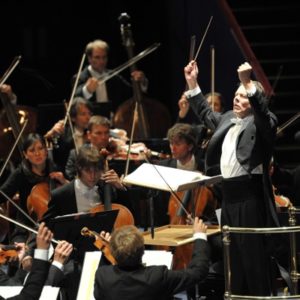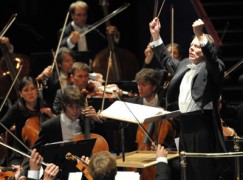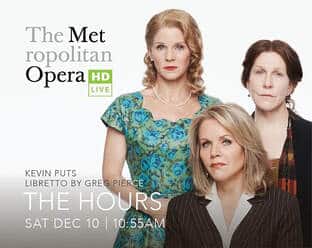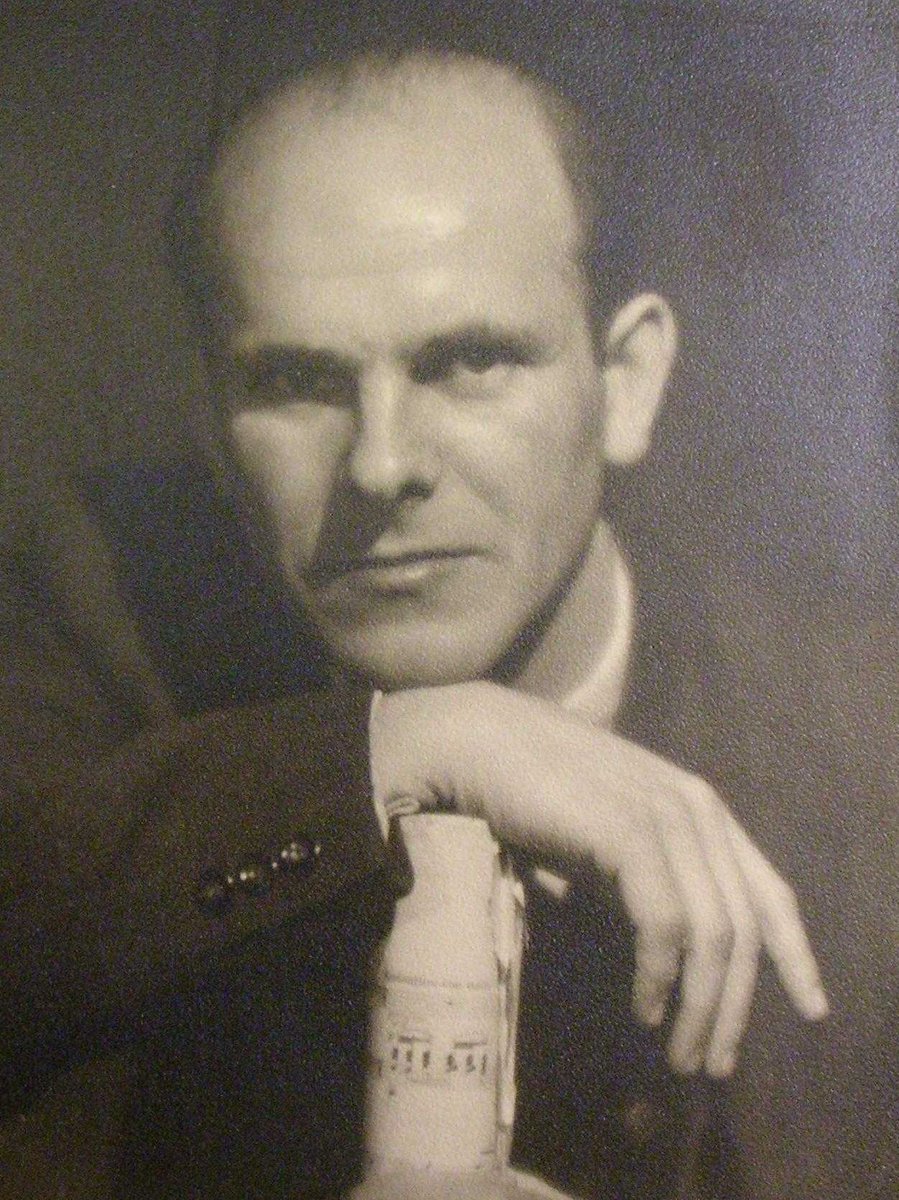Jansons collects Karajan’s 50k
mainThe Latvian conductor is to be awarded the EUR 50,000 Herbert von Karajan Prize at the 2019 Salzburg Easter Festival, it has been announced today.
For what earthly purpose? Why do classical organisers think that shifting irrelevant sums among rich maestros enhances in any way the state of our universe? Might Mariss be tempted to share the money among musicians who suffered in Karajan’s 30-year musical Reich?

photo: Christodoulou/BBC






Suffered under Karajan ? During his time there were at least 7 recordings per season plus many films and lucrative tours all which added income to the musicians.
Until the musicians rebelled and made it known to the maestro that they were no his private studio orchestra.
Edgar: Do you even have any idea of what you are saying? Celibidache was “passed over” in 1954 because the the BPO saw a bigger financial future and prosperity with HvK (!) – in fact, the musicians became multimillionaires thanks to K’s “private studio orchestra”, a term you by the way also used wrongly; the BPO did most of their most succesful recordings before presenting them in concerts to the international public.
Not forgetting a very important competition that lasted 16 years, education programs, a Karajan/BPO Academy for young players, programs for autistic children in Salzburg, private medical care for his own musicians and others and a lot etcetera, and 9 out of 10 times, out of his own money.
NL’s allergy towards Karajan starts to be a very very old bad joke.
All true. Karajan was certainly no saint, and had a myriad of failings, both personal and professional. But, there seems to be no chance of a balanced, or nuanced view of him from this site.
“Carlos Kleiber not a great conductor”.
Suffered? Please… the BPO under HVK were well-paid, and happy. Hardly any defections to other orchestras, ever. For all his autocratic behavior, Karajan treated his orchestra well, and with respect. Only at the end did things get unpleasant. To your point about the Award, I agree 100%. What point does it serve, awarding a successful, no doubt wealthy conductor, 50K?
Manus manum lavat…
Natural authority being confused with Authoritarianism…
Where is the world going…
https://www.youtube.com/watch?v=Jspeza3hfD8&t=2s
Maybe I am getting off topic, but I can’t resist a question: in this clip he rehearses with his eyes open. How often did Karajan conduct, in concert or rehearsal with eyes open? He famously conducted a lot with eyes closed, an issue also discussed on record by orchestral musicians.
Petros: Easy; a rehearsal is work, like a field-marshal planning a military operation and overseeing all possible strategies with his troopers. A concert is the delivery, so he just shut his eyes and let the players do their work in the most natural way, to the enjoyment of whoever had the luck to be present.
Hear for yourselves – a good knowledge of german is advised:
https://youtu.be/NM_WotT6YFU
Yet another “award for being famous” award, it seems.
I guess for some awards, that must be the whole point: the prize committee looks around at all the available candidates and says “who is famous enough to add to our list of famous winners?”
Personally I like the idea of the Gilmore (sp?) Prize for pianists, the one where the candidates don’t know they are under consideration until they are suddenly announced as the winner. The committee — whoever it’s comprised of — feels confident enough in their own judgment that they don’t have to wait until someone’s merit has been confirmed by the marketplace.
“Yet another “award for being famous” award, it seems.”
A stipulation is that the recipient of the prize, much like with the old HvK Prize (Baden-Baden), must use the money in its entirety in support and advancement of young talent and up-and-coming musicians.
Great, glad to hear it!
I also feel the Gilmore gets it right. The winners are usually in their 30s, mature enough to show what they really can do, and often in need of help for their careers. They are entering what can sometimes be an awkward career phase: too old to be hot for the media and too young to be elder statesmen. More important, the line up of Gilmore laureates speaks for itself.
Not like the Nobel Peace Prize, or anything. These days it has about as much prestige as those prizes you used to get for subscribing to “Readers’ Digest”!!
Controversy over the Nobel Peace Prize is nothing new, both with regard to laureates (e.g. Arafat) and notable omissions (e.g. Mahatma Gandhi). Maybe the growing antiestablishment sentiment is taking a further toll on its reputation.
Suffered during Karajan’s musical reich? For goodness sake, Karajan’s players were among the highest paid in the world with an abundance of royalties from recordings. Where they suffered financially is when he left.
AND…he did not have the reputation as a tyrant. Many others were during the 40s, 50s, 60s etc.
I would like to have a civil discussion about HvK’s orchestral recordings that avoids politics and personality. With the exception of his Bruckner and a few Beethoven symphonies, I find his recordings largely unlistenable. The common trait I find offensive in his recordings of Schumann, Schubert, Dvorak, Sibelius, Brahms …is his habit of arbitrarily inserting beautiful legato playing which destroys the line and to me has nothing to do with the piece. In the case of his take on Holst’s-Planets it just comes off like a bad Google English -> German translation. Respectfully what am I missing?
A very great deal is what you are missing, but sadly I just don’t have time to take you through it all. I wish I did because the riches are considerable and it’s sad that you cannot hear them.
So much for civil!
I have a similar feeling. I collected a lot of the HvK recordings prior to 2000 and have gotten rid of most of them as my listening experiences expanded to far better conductors and interpretations. I have retained his studio Falstaff, the live Trovatore with Price and the live Lucia with Callas. Nothing symphonic – no Mahler, no Bruckner, no Beethoven, no Strauss…
What was uncivil about that? I think you’re missing a lot and I think that’s sad. That’s what I said. If I want to be uncivil I can do much better than that.
I wonder if it’s really worth the time and effort replying to Amos, s comments. He may have his own opinions about music but I this case they are crass and pathetic
As there are dozens of options to listen to I suggest you try some other conductors. Expressing a negative view of a conductor universally acknowledged to have been one of the most influential in his time is not very fruitful.
I don’t think this is any time to hear these frankly tiresome criticisms of Karajan’s conducting. Frankly you can make a case against any conductor whose style you don’t like. Just better to say you don’t like his style rather than going through the tired arguments we have heard countless times.
Amos,
I know exactly what you mean, even though I don’t agree.
I have been a classical music performer since high school, and a listener since much earlier. I’m now in my late 60s.
I shared your opinion for a long, long time.
But for whatever reason, Karajan clicked into focus for me about 15 or so years ago when I heard his Das Lied von der Erde on DG.
From then on, his other recorded interpretations made sense to me. (Of course, like any other conductor, he had his strengths and weaknesses.)
Perhaps one day you will hear the one HvK recording that will do the same for you; perhaps you never will.
But the long musical line, the masterful control of dynamics (short-term and long-term), the gorgeous sound, the unanimity of the orchestra’s playing, the mastery of his principal players – that’s what I hear and like.
Hope this helps a little bit….
Thanks to you and PL below for agreeing to have a conversation rather than a petulant rant for my having the temerity to question a widely regarded genius. I hear everything you describe but for me, it comes across as an end unto itself rather than assets in the service of the composer. Recent examples were a Sibelius 2d and Dvorak 8th I tried which sounded beautiful but were presented as though they were composed by the same person. Ormandy is often criticized for inappropriate use of the orchestra’s lush string sound. In HvK’s case, I hear something similar with the entire orchestra. Wasn’t a prominent former member of the BPO recently interviewed or quoted on this blog saying that the HvK approach to the orchestral repertoire was ill-suited to many central European composers but perfect for French composers? Regardless, thanks again!
Personally I think that Karajan was at his best in opera. He mostly worked with the best available singers, whose contribution perhaps made up for Karajan’s shortcomings in characterization. These are of course very broad generalizations. If you asked me, however, about my preferred conductors born from the 1890’s through the 1910’s, I would name quite a few before Karajan: de Sabata, Szell, E Kleiber, Mravinsky, Fricsay…
Here is my very personal take.
One can always count not only on good legato, but also on beautiful phrasing, very natural pacing and rich sonority. The latter often comes at the expense of textural transparency. I find that in live recordings from the 1950s and 1960s, his strengths far outweigh his drawbacks. Less so in his last two decades, though some people blame that on the recordings.
One Karajan recording I really like is his 1951 Meistersinger from Bayreuth. Also lots of good live recordings from Salzburg. A 1960s Trovatore with Price and Corelli is fabulous, to the point that I can be forgiving for the poor recording quality.
His recordings of the Sibelius 4th, 5th and 7th are the stuff of legend. By the way, the early ones with the Philharmonia won even the strong approval of Sibelius himself, while his later ones for DGG offer way more insight, underlining all the natural elements of this “un-programmatic” and very subjective music.
“Nobody understands my music better than Karajan”, a quote by Sibelius himself
(although he might have said the same to Barbirolli and very few other conductors!)
And unless you have a serious problem with Karajan’s overall concept of beauty and extraordinarily well-blended orchestral sound, try his Richard Strauss, his Schönberg Verklärte Nacht and the Orchestral Variations op.31, his Honegger’s Symphonie Liturgique or his Shostakowich 10th.
Love it or hate it, he sat the bar very high and his standards will always remain irreplaceable.
And returning to the topic, Mariss most certainly
deserves the prize, having been a student of HvK’s, and propably even his best.
Well, maybe I can give the “civil” part a try…
He clearly had his own musical vision, which (also clearly) involved his own concept of beautiful orchestral sound. I agree that sometimes this can be distracting, in the sense that the sound is so beautiful (IMHO) that you kind of have to sit there and go “wow… that is beautiful playing” and momentarily forget about what piece you’re listening to.
I don’t believe he did this purposely, in the sense of “I don’t care about the composer or the piece, I just want my trademark gorgeous sound wherever possible;” but I do think it became more pronounced as he got older, and it could come across as a kind of laziness, or at least a focus on his own agenda at the expense of the musical message.
In the same way, I find Harnoncourt’s later recordings (e.g. a set of Brahms symphonies with Berlin) have a tendency to magnify his quirks as well: he seems so intent on finding hidden textures and rhythms that his recorded performances run the risk of turning into a collection of quirks. When I come across his earlier recordings I’m always surprised at how “normal” they sound.
There are conductors who avoid this, of course: Haitink and Abbado (of course there are others) never seem/ seemed to develop a standard interpretation, in the sense of giving different composers “the Karajan treatment” so that Sibelius and Stravinsky end up sounding remarkably similar. Sometimes this can be helpful: for example, if Berg can be played as if it’s beautiful music, it may help a tentative listener get through the thorns without too many painful scratches. Then you can try the Boulez version 🙂
I would say that a lot depends on the taste of the individual listener, and how far you are willing to come to try to see (hear) things from the interpreter’s point of view. But at some point yes, you do have to ask yourself “does this approach really serve the music? Or is it mainly serving the musician?” Different people will find the tipping point in different places.
One thing you can always rely on, though: there will always be people who find joy in telling you you’re an idiot for liking what you like, or for not liking what they like. I’d recommend trying to stay open to a reevaluation of your opinions — maybe in a few years you will find something in “the Karajan approach” that you don’t find now. Or maybe not.
^ not sure where those random italics came from
Very well put Bruce. Karajan went for a plush beautiful sound with huge orchestra forces. This kind of approach has gone out of fashion, partly because many think this kind of “orchestral glop” homogenizes the sound across all different kinds of pieces and lacks texture. Whether this approach works for you (or not), Karajan was a remarkable conductor in getting the sound he wanted from the orchestra while nevertheless maintaining the long line.
Did not he deserve the PRIZE?
“Musical Reich”. Absolutely appalling expression. “Suffered”? Even worse.
My compliments to the chef. You certainly do know how to spices up what you serve Mr. L.
At his best Karajan was outstanding (whatever misgivings one may have about his past, his personality etc etc…).